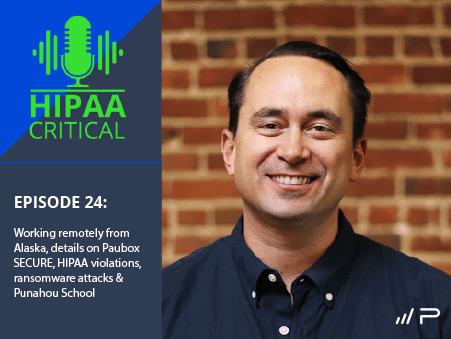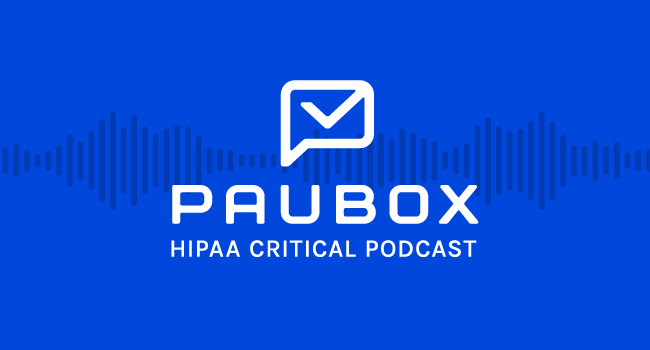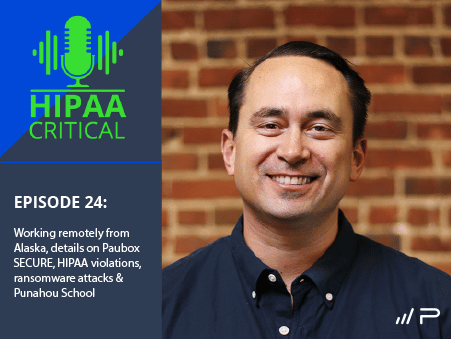8 min read
16. Hoala Greevy "The long-overdue digital transformation in healthcare is here, and it's here in force."
Paubox May 27, 2020 12:00:00 AM

In episode 16 of HIPAA Critical Podcast, Hoala Greevy joins us to chat about the rapid recovery stage for hospitals, we take a deeper look into who is winning this week and who is failing, chat about the HIPAA Breach Report for May and learn more about how Beaumont Health's email breach could impact 114,000 patients.
Rather read?
Here’s the full transcript of this episode.Olena Heu: Welcome to another edition of the hypocritical podcast. I'm your host and joining me this week is the founder and CEO of Paubox. Hoala Greevy.
Hoala Greevy: Hello.
[THEME MUSIC] Olena: Thanks so much for joining me again. Hoala. Great to hear from you.
Hoala: Yes. Been a while. Glad to be back. Thanks for having me.
Olena: You've been a very, very busy man. So totally understandable. And it's been a crazy time. How have things been just overall?
Hoala: The long-overdue digital transformation in healthcare is here, and it's here in force. And our customers are needing help six and seven days a week, which means we're working six to seven days a week. So it's been talked about for a long time, and it feels like it's finally here. For better or for worse, it is here right now.
Olena: And thank you so much for everything that you've been doing to help people, organizations and patients you know, stay in touch.
Hoala: Yeah, I mean, this is why they, as Chris Berman would say from Sports Center, this is why they play the game. This is why we're here.
Olena: So tell me a little bit about, you know, what's in the news right now and it's U.S. hospitals in what you're calling the rapid recovery stage. What does that mean?
Hoala: So at the beginning of the Coronavirus outbreak in the United States, U.S. hospitals were in a rapid response phase, which meant, you know, updates being sent to the community and to their employees and patients, seven days a week on information updates, equipment shortages, you know, over staffing, what have you and now as we see a slight drop off in cases, of course, we still don't have a vaccine or enough testing, but we are seeing a slight drop off.
So now that hospitals are entering what's now known as a rapid recovery stage, and what they've been telling patients with non life threatening procedures that they needed to get done to hold off, while they, you know, prepared themselves for COVID-19. Patient intake. Now they're saying, Hey, we need you to come back in. We need this high margin surgery for our revenue. And so they've lost as much as 80% of their revenue over the past two months.
And now these U.S. hospitals are very keen to get those patients back in the door and get those procedures done so that they can capture some revenue. Now, there's several stories about it in the New York Times. Both estimates are U.S. hospitals are losing $50 billion a month in lost revenue due to COVID and not accepting patients for non-essential, or non-emergency procedures, so that is a big trend going on right now. Rapid recovery.
Olena: Yeah. And you know, obviously, with COVID, you know, on the downfall, they are opening back up to those other types of procedures. One of my friends, she injured her knee and she was unable to have knee surgery for a month or so because of that. And then the day that they lifted that rule, she went in and she had her knee surgery. So it's something that is also needed for the patients but then, as you can see needed by the hospitals.
Hoala: Well. Yeah, that's exactly it. That time, you know, 1000 exactly that. And so, I mean Coronavirus is still here. I think we're gonna see another spike, perhaps this Summer, definitely by the fall. But you know, people have to get business done. So we're seeing a small reopening.
Olena: And is Paubox busier as well? Because you are seeing this rapid recovery taking place.
Hoala: Yeah, so we have a product called Paubox Marketing that enables HIPAA compliant email marketing with patient information. So we have customers using that, including a large hospital system in Hawaii. So we've been with them along the way as they went from rapid response, which was seven days a week. Now it's rapid recovery. Let's do outreach to the patients, get them in the door.
And then at a higher level. You know, the ugly truth around healthcare in the United States, is that the fax machine remains the backbone of communication infrastructure. But when all your employees are distributed, you know, working from home, the fax machine just doesn't work anymore.
Right. So finally, at long last all of these tools that are part of the digital transformation playbook that these healthcare orgs have pushed, pushed off all these years. They can't run their business without these tools. So that's where we're seeing the acceleration come from. Everyone's working remote distributed. And basically, the solutions that work best for a distributed environment are cloud based. So that's where we're seeing a strong uptick in interest in signups.
Olena: Excellent. And you know, each week on our hypocritical podcast, we like to feature those that are winning, and those that are failing. We like to start with the good news first and this is also related to Paubox Marketing.
Hoala: Yeah, so, about a month ago, we did outreach to our customer base to see you know, if they're using our products for outreach to patients in the community during COVID, and sure enough, quite a few are.
And one of the highlights of that outreach was Nizhoni Health, and they're based in Massachusetts, and they're one of the larger health care providers in their sector in the state. And they've been using our solutions to communicate securely and effectively with their patients, their vendors, and with the local government bodies, because they have such a large presence on the ground in nursing homes and healthcare facilities.
They've been able to securely communicate the data they're seeing to government bodies. And then when it comes to ordering equipment like N95 masks, that efficiency of communications with their vendors has been of great use to them as well. So I'd say Nizhoni Health, Dave Ledoux our man over there and IT Director, those guys are winning for sure.
Olena: How is Massachusetts doing overall? kind of ironically, before this all happened I had gone to Boston and then literally landed and then all of this COVID thing happened.
Hoala: Oh man you're in Wow. Yeah, man I don't they're New York's been stealing all the headlines. I have no idea how Boston or the state's doing. Everybody's got Cuomo this and Cuomo that.
Olena: Yeah, I think when New York was kind of in the midst of the whole COVID people were forecasting that Massachusetts would be the next hot spot. But I don't believe that that actually happened but I'm on my way back home I did have a little bit of a cough and I was coughing on the plane and I definitely got some dirty looks.
Hoala: Wow. But turned out to be okay.
Olena: Yeah totally. I think it was just, you know, the traveling and the dry air and it was very cold. It was February at that time. So, but, you know, we focused on someone who's winning and now we're going to highlight a failure because there is a lot of learning to be had when someone is failing and tell us more about what has been covered in our HIPAA breach report as well.
Hoala: Yeah, sure. So we recently released our may HIPAA breach report. And a lot of the trends remain the same. Email took the top rank, as far as number of people's healthcare records affected by a breach and also a number of incidents in a month.
And the big outlier as far as the record breach was Beaumont Health due to an email breach that occurred shucks I want to say over a year ago, and they apparently only recently discovered and the bad actors had access to several employee accounts, where they may have compromised up to 114,000 patient information. So that to me would be the loser, fail of the month would be Beaumont health. Fortunately for that data breach.
Olena: Is there very much that can be learned about a breach that happened a year ago?
Hoala: It could be a black eye, I'd say for not knowing attackers have been in your system for a year or more. To me, once again reinforces the need for robust email security solutions to layer on top of products like Office 365 by Microsoft, or I guess as they're calling it, Microsoft 365. Many of the email breaches are happening under their watch. And then again, just strong encouragement to enforce two-factor authentication for all of your email users, because if you've got to enter in a six digit code that gets sent to your phone, or is generated from an app on your phone, that's really gonna keep up the bad actors who may have compromised your password but of course they don't have your phone. Good to know a good reminder as well.
Olena: So any predictions as we continue to move forward during these unprecedented times?
Hoala: Yeah, shucks. So, I think the rural hospitals in America or there might be a larger amount than we are willing to admit that close due exactly to this, you know, you have this, this COVID outbreak, followed by high margin. Basically elective surgeries or non emergency surgeries not being done 80% of revenue or more is lost during that eight week period.
I think some of these rural hospitals with a smaller population base and therefore, less opportunity to capture revenue would be in risk of permanently shutting down, which then affects the health care of the residents in the surrounding areas, of course, so that might be something unfortunately, we're going to see, again, there's no vaccine.
So what is there that to prevent another wave from happening later this year? I mean, the earliest level vaccine testing ready from the reading I've done is January 21, which is still quite a ways off. And then, but the overall trend is, fortunately, for companies like us, you know, we bet early on that HIPAA compliant email really didn't exist.
And the fax machine with this huge white elephant in the room that has been needing to be replaced for years, and HIPAA compliant email is, of course, a valid way to get rid of that. And we've just chosen to hyper focus on healthcare.
And it seems to be paying off with this turbulent environment we're in right now. So digital transformation and healthcare is finally here. It's been long overdue. And I think it's going to continue to be here for several years, as the industry has no choice but to catch up.
Olena: Very true. Very true. And, you know, when you're talking about the hospitals, I was thinking about the fact that, you know, a lot of them are nonprofits or are not for profit. And then you do have some that are for profit organizations. And, you know, if they were to file for bankruptcy this domino effect of how this is going to affect our community. What do you think about, you know, are there methods that we could potentially help the hospitals from closing?
Hoala: The only thing that comes to my mind right now is a wave of bailout money. I don't, I don't really see any other way to prevent it. And then what's even worse, too, as you know, if you've got a rural community, there's probably a correlation between that and health problems, at least, it's certainly the case in a lot of sectors in Hawaii, as you and I both know, Olena.
So, you know, there's just higher likelihood for COVID patients being adversely affected, which then, you know, if that hospitals forced to close, because the actual revenue generating procedures that they normally depend on to keep the lights on, they aren't allowed to do in this time of crisis. Where are those people going to go? So, yeah, we'll see how that bears out. I hope I'm wrong. But I just don't see any other outcome at this point with the data we have.
Olena: I agree, it would have to be something like federal bailout money but we'll see how people can potentially and hopefully get back on their feet and just hope for a vaccine very soon.
Hoala: Yes.
Olena: Well, thank you so much for joining me this week. Hoala, a pleasure as always to speak to you and if you like what you hear, be sure to like follow and subscribe to our HIPAA Critical podcast. And for more information you can log on to our website paubox.com. Thanks for tuning in. [THEME MUSIC]
Subscribe to Paubox Weekly
Every Friday we'll bring you the most important news from Paubox. Our aim is to make you smarter, faster.


